COACHING
“Learning is yet to happen.”
– the coaches –
The training for trainers was planned and carried out by Educraftor and Tartu Art School (TAS), who worked in close collaboration throughout the project.
The project was a learning process also for the coaches as they challenged themselves by taking new roles for themselves in the training. Traditionally, Educraftor operates in the role of coaches but this time they developed their visual thinking skills by making the plans and also the online training sessions more visual than before. The trainers from Tartu Art School for their part practiced coaching the design thinking process.
Co-designing the coaching process
The designing of the coaching process started with an intensive dialogue between Educraftor and TAS coaches. Some of the main topics were:
- The purpose of the project was crystallised through this metaphor: We support the young learners to paint themselves out of a corner.
- One of the main goals will be to encourage people to use drawing and visual thinking as a method.
- How visual do we make the training?
- How do we structure the methodology?
- The issue of combining two methodologies: Are we making a visual version of design thinking or are we weaving design thinking stages into visual thinking?
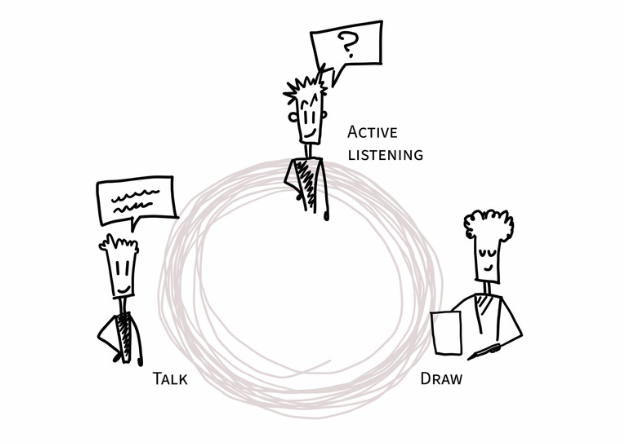
The design thinking process gave the framework for the participants to work in, and the visual thinking tools made the learning explicit and supported both the coaching as well as the design thinking process.
Therefore, all three core elements – team learning, design thinking and visual creativity – were designed to connect and support one another.
Comments from participants
SCHEDULE
1st round: online training
The online training sessions happened between November 2021 and March 2022. These sessions are described in the next few pages. It was the 1st iteration of the design thinking process.
2nd round: train the trainer
It was seen as beneficial for the participants to go through all the training sessions before replicating them locally. The timeline for the replication was then set from March to June 2022. It was the 2nd iteration of the design thinking process.
The trainers were instructed to carry out the replication following the online training sessions. They first engaged peers they felt were interested in the topic to add in new knowledge and skills, and to continue their own learning process with their peers. They could also invite local educators into a session and start by empathising with each other and with the people that they all work with. And then taking it further from there, going through the 5 stages of design thinking.
3rd round: supporting local youth
At the end of the replication phase, the goal was that all participants (trainers and trainees) will be ready to implement the methodologies (design thinking and visual creativity) into their work/ courses/ projects in the autumn semester of 2022. It was the 3rd iteration of the design thinking process.
By going through the 5 stages of design thinking, the aim was for the trainers and trainees to have a learner-centric approach in autumn activities and help their students first find some problems around them, and then start solving these issues with the methodologies of design thinking and visual creativity.
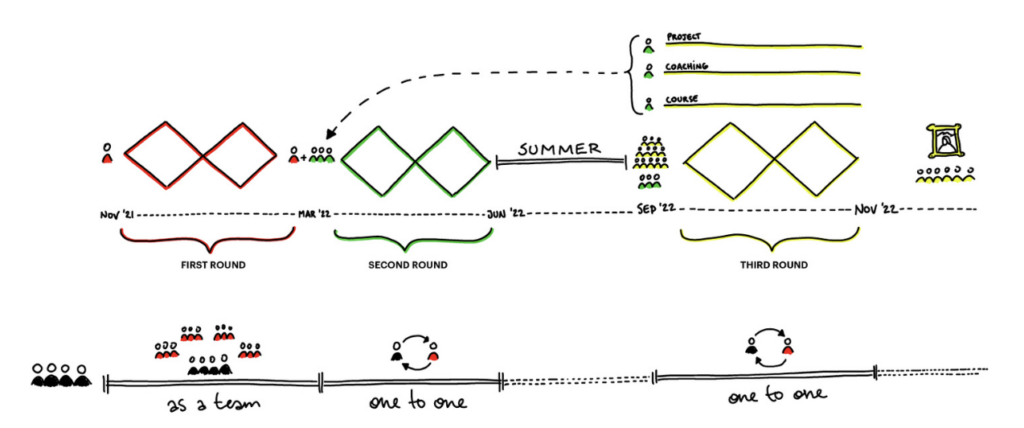
Individual coaching
The coaches offered their support during the second and third rounds. The individual coaching sessions happened as online meetings, and were adjusted to everyone’s own schedule, goals and needs.
You can learn more about the coaching process and the contents of the training sessions from the guidebook.
The coaches
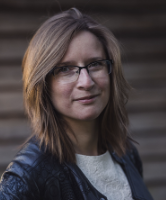
Maria Kiisküla
Teacher, Tartu Art School
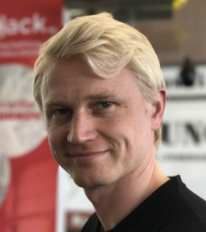
Juhani Koivuviita
CEO & Co-founder, Educraftor
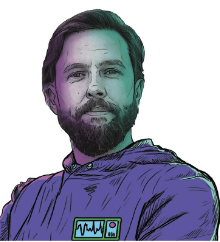
Deniss Jershov
Teacher, Tartu Art School

Peter Fagerström
Founder, Educraftor
